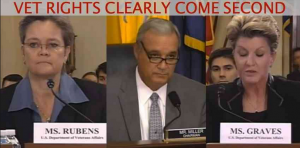Unethical behavior infects an organization much like a cold virus spreading in a classroom filled with third graders. Unless strong ethical standards are in place, poor ethics runs rampant without regard to the title, department or mission.  Perhaps no governmental agency has been more emblematic of poor ethics than the Veterans Administration.
Perhaps no governmental agency has been more emblematic of poor ethics than the Veterans Administration.
It’s kind of strange when we think about, for almost no government agency has a higher purpose or a greater mission than helping those who have sacrificed so much for our country.
In the latest scandal to befall the VA, it is the tale of two high-ranking executives, Diana Rubens of Philadelphian and Kimberly Graves of St. Paul, Minnesota. These formerly high-ranking executives have been demoted, but not otherwise penalized for their roles in agency scandals.
Fox News (January 8, 2016), in an article entitled: “VA execs finally demoted for scamming system, but lawmaker asks why no charges brought,” states:
“The Department of Veterans Affairs said Friday two high-ranking officials were finally demoted in response to a federal probe that found they manipulated the agency’s personnel system for their own gain, but a key lawmaker is asking why they weren’t prosecuted.
The report detailed how the VA executives pressured subordinates to accept position transfers only to volunteer for the vacated jobs while keeping their original salaries and having the VA pay them more than $400,000 in taxpayer relocation benefits.”
Apparently the scheme was cooked up because a residence the high-ranking executives owned was not selling, to enable them to get a heap of money for moving expenses they never used. The charges against them were so outrageous that they refused to testify to Congress to protect themselves against self-incrimination. While they were demoted, they were allowed to keep their high salaries!
“Rubens and Graves kept their salaries of $181,497 and $173,949, respectively, in their new positions, even though they had less responsibility and a lower pay range than their previous positions.”
Investigations leading nowhere
Although members of Congress have been demanding how the VA conducts its business (such as the infamous wait-list scandal), the VA bureaucracy is so ingrained and so impervious to outside examination that almost no scandal ever completely resolves itself.
In the cases of Diana Rubens and Kimberly Graves, the congressional investigators want to know why these women were demoted, but did not receive any other penalties. They are essentially doing less but getting paid just as much – and they were never prosecuted for stealing hundreds of thousands of dollars in taxpayer money after manipulating the system. So where does all of this lead us? It leads us to an ethically sick system.
The Veterans Administration dates back to 1930, but veterans programs have been in place since 1917. In that 98-plus year time span, the agency seems to have not only lost its way ethically, but it has under-served the very people it is supposed to protect and assist. I shudder to think how many other agencies in our government also have such poor ethics in place.
It is very easy for a high-ranking politician to say, “We need more ethical oversight.” However, the institution of an infrastructure such as a “Department of Internal Ethics,” could be as hard to manage as the VA itself; bureaucracies love bureaucracy. In my opinion, far better for there to be not only an increase in penalties, fines and even jail sentences, but to expand the efforts to penalize wrong-doing by publicly shaming and publicizing wrong-doing.
In the case of these two executives, the first time they invoked the Fifth Amendment should have signaled harsh penalties. We all have the right to avoid incriminating ourselves, but as taxpayers we should also have the right to stop paying wrong-doers.
YOUR COMMENTS ARE WELCOME!



More and more we see poor ethics in government and administrative bodies. This is very disheartening and has to change. Corporate america needs to model ethical behavior.